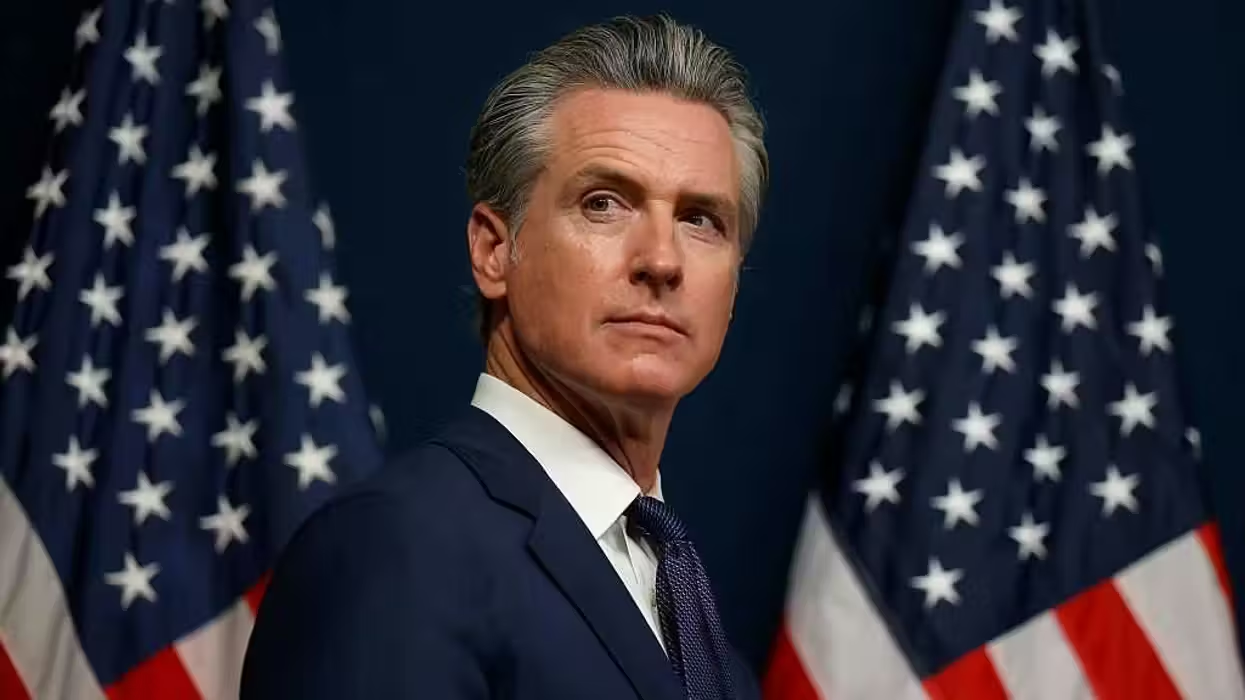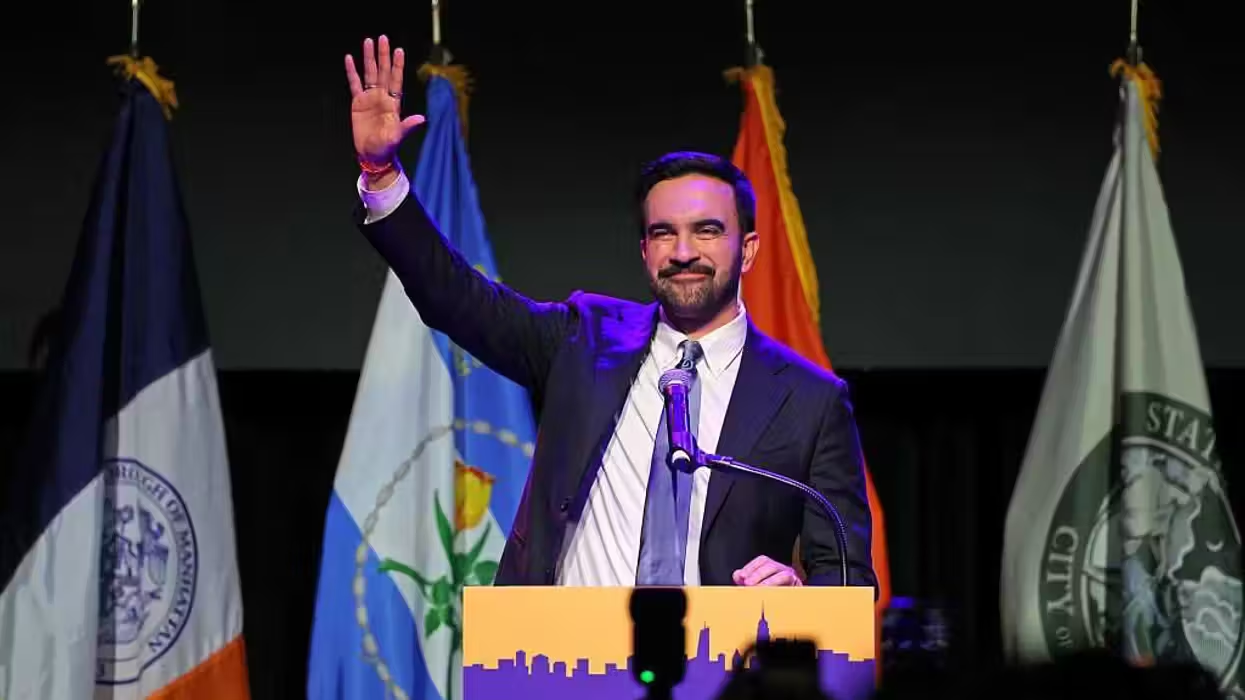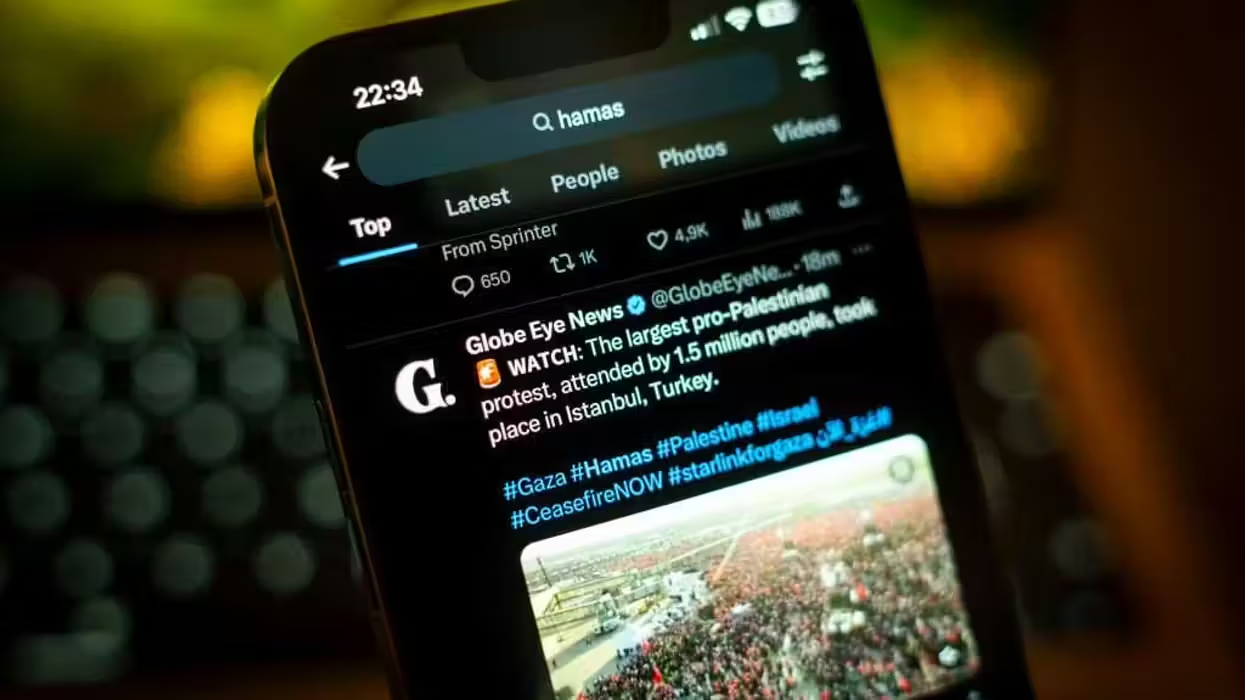I have spent six years and two months wondering about President Barack Obama’s decisions in the global war on terror. In the beginning I chalked them up to naiveté or incompetence. I have changed my mind.
In his apology tour in June of 2009 in Cairo the president assured the Muslim world that his role was to “fight against negative stereotypes of Islam wherever they appear." I just attributed that to a narcissist’s belief that a few well-crafted words from him would heal the world.
Two months later the people of Iran begged America for support in their fight for freedom and dignity. I attributed the president’s muted response to timidity, but the result put the United States on the side of the world’s foremost sponsor of terror.
 A picture taken on June 04, 2009 shows US President Barack Obama delivering his much-anticipated message to the Muslim world from the auditorium in the Cairo University campus in Cairo during a one-day visit to Egypt. Credit: AFP/Getty Images
A picture taken on June 04, 2009 shows US President Barack Obama delivering his much-anticipated message to the Muslim world from the auditorium in the Cairo University campus in Cairo during a one-day visit to Egypt. Credit: AFP/Getty Images
During the Arab Spring we aligned with those who fomented terror and against the autocrats who had contained it.
When the president drew the Red Line in Syria, and then abandoned it, Iran’s client, Bashar al-Assad, was left standing.
During the past few weeks it has become painfully clear that none of the president’s decisions fell against Iran and its pursuit of hegemony over the Middle East. That record cannot be naïve. It has to be purposeful.
The United States imposed economic sanctions on Iran after the capture of 52 hostages in 1979. In December 2006 the United Nations Security Council passed increased sanctions after Iran refused to halt its nuclear enrichment program. The sanctions have damaged Iran’s economy and prevented it from buying conventional arms. At the end of 2013 about $20 billion of their assets were frozen.
Iran has huge financial requirements. Their nuclear enrichment program is expensive as is their funding of terrorism in Lebanon, Syria, Yemen, Iraq and the Palestinian territories.
When Iran agreed to sit down for talks about their nuclear program there were two factors in play. Iran was desperate for its $20 billion and the Obama administration was desperate for a legacy.
After promises of cooperation President Obama decided that Iran was dealing in good faith and agreed to release $8 billion of Iran’s frozen assets.
 In this handout photo provided by the White House, President Barack Obama speaks with President Hassan Rouhani of Iran during a phone call in the Oval Office September 27, 2013 in Washington D.C. Getty Images
In this handout photo provided by the White House, President Barack Obama speaks with President Hassan Rouhani of Iran during a phone call in the Oval Office September 27, 2013 in Washington D.C. Getty Images
Then things started to change. The deadline kept getting pushed back. Iran’s promise to allow unannounced inspections was withdrawn. Iran’s promise to open its books to an audit of past nuclear activity was withdrawn. They are reluctant to sign a written agreement.
To assure Iran of our good faith, in the last month we worked to defeat Israeli Prime Minister Benjamin Netanyahu in his re-election and declassified previous secrets about Israel’s nuclear program.
We removed our last Special Forces troops from Yemen clearing the way for Iran, through its Houthi militia, to take control of another nation and the $500 million worth of munitions we left behind.
When Iran joined the battle to recapture Tikrit in Iraq we sent American air power to aid Iran’s effort to turn back the Islamic State in their intramural battle for control of Iraq.
The president has chosen to ignore Iranian expansionism in order to get a legacy deal on Iran’s nuclear program. Retired Lt. Gen. Michael Flynn, former chief of the Defense Intelligence Agency, characterized it on Fox News Sunday as “a policy of willful ignorance.”
Former Obama ambassador to Iraq James Jeffry said, “We’re in a goddamn free fall here.”
A senior state department official urged us to ignore the distractions. He said we should “recognize that we’re one agreement away from a game-changing, legacy-setting nuclear accord on Iran that tackles what everyone agrees is the biggest threat to the region.”
 Iranian demonstrators burn a representation of a U.S. flag and a caricature of President Barack Obama, in an annual state-backed rally in front of the former US Embassy in Tehran, Iran, Friday, Nov. 2, 2012. The rally marks the Nov. 4, 1979, storming of the building by militant students who held 52 Americans hostage for 444 days to protest U.S. failure to hand over the toppled shah Mohammad Reza Pahlavi to Iran for trial. Gen. Mohammad Reza Naqdi of the powerful Revolutionary Guard, not shown, addressed the rally saying the U.S. must annul the CIA, pull out its warships from the Persian Gulf and dismantle its military bases from 50 countries around the world if it wants to restore ties with Tehran.
Iranian demonstrators burn a representation of a U.S. flag and a caricature of President Barack Obama, in an annual state-backed rally in front of the former US Embassy in Tehran, Iran, Friday, Nov. 2, 2012. The rally marks the Nov. 4, 1979, storming of the building by militant students who held 52 Americans hostage for 444 days to protest U.S. failure to hand over the toppled shah Mohammad Reza Pahlavi to Iran for trial. Gen. Mohammad Reza Naqdi of the powerful Revolutionary Guard, not shown, addressed the rally saying the U.S. must annul the CIA, pull out its warships from the Persian Gulf and dismantle its military bases from 50 countries around the world if it wants to restore ties with Tehran.
Credit: AP
When that legacy is written Iran will get its $12 billion dollars that remain frozen and President Obama will celebrate “Peace in Our Time.”
There will be no audit of Iran’s past enrichment activity. There will be no unannounced inspections. The enrichment facility that Iran has deep underground will continue to operate unhampered.
“Trust, but verify,” will have been reduced to a very frugal “trust.”
We will have legitimized Iran’s nuclear capability and they will have operational control of Iraq, Syria, Lebanon and Yemen. They will be looking at Jordan and Israel through gun sites.
Meanwhile Saudi Arabia and Egypt have begun military action in Yemen to push back against Iran. America was not informed before the operation was begun because they didn’t trust the president not to leak it to Iran.
The leader of one Gulf country said; “We believe it is more dangerous to be a friend of America’s than an enemy.”
That too is a legacy and perhaps the lasting one.
–
TheBlaze contributor channel supports an open discourse on a range of views. The opinions expressed in this channel are solely those of each individual author.


 A picture taken on June 04, 2009 shows US President Barack Obama delivering his much-anticipated message to the Muslim world from the auditorium in the Cairo University campus in Cairo during a one-day visit to Egypt. Credit: AFP/Getty Images
A picture taken on June 04, 2009 shows US President Barack Obama delivering his much-anticipated message to the Muslim world from the auditorium in the Cairo University campus in Cairo during a one-day visit to Egypt. Credit: AFP/Getty Images





